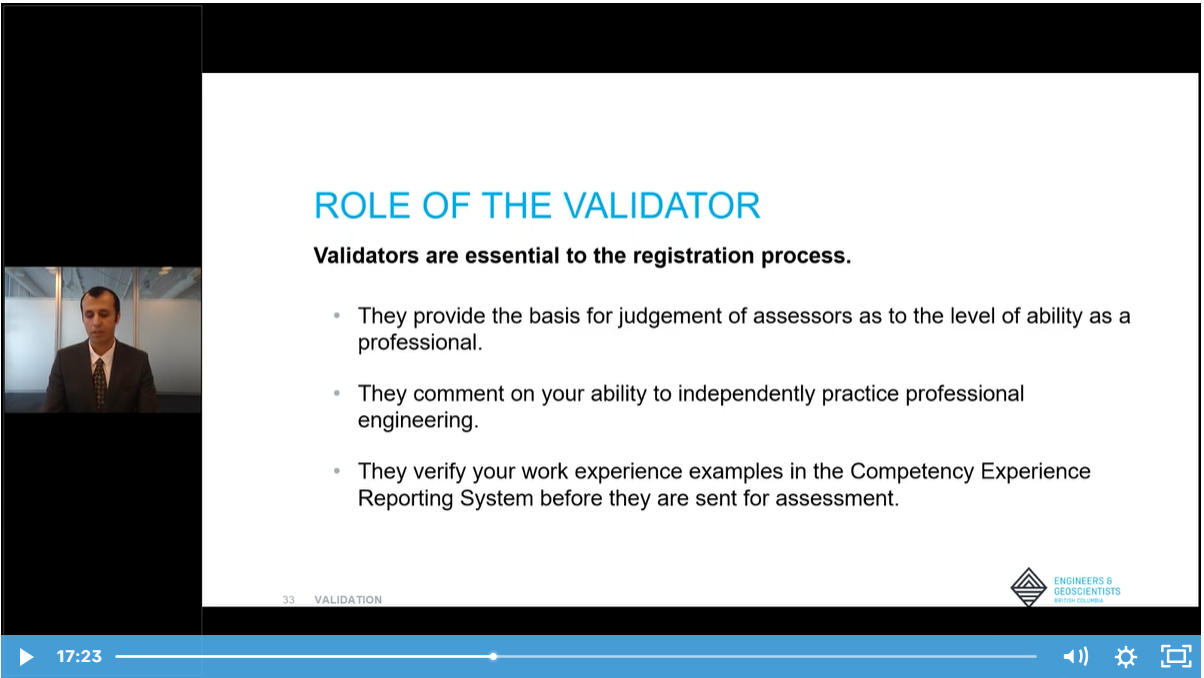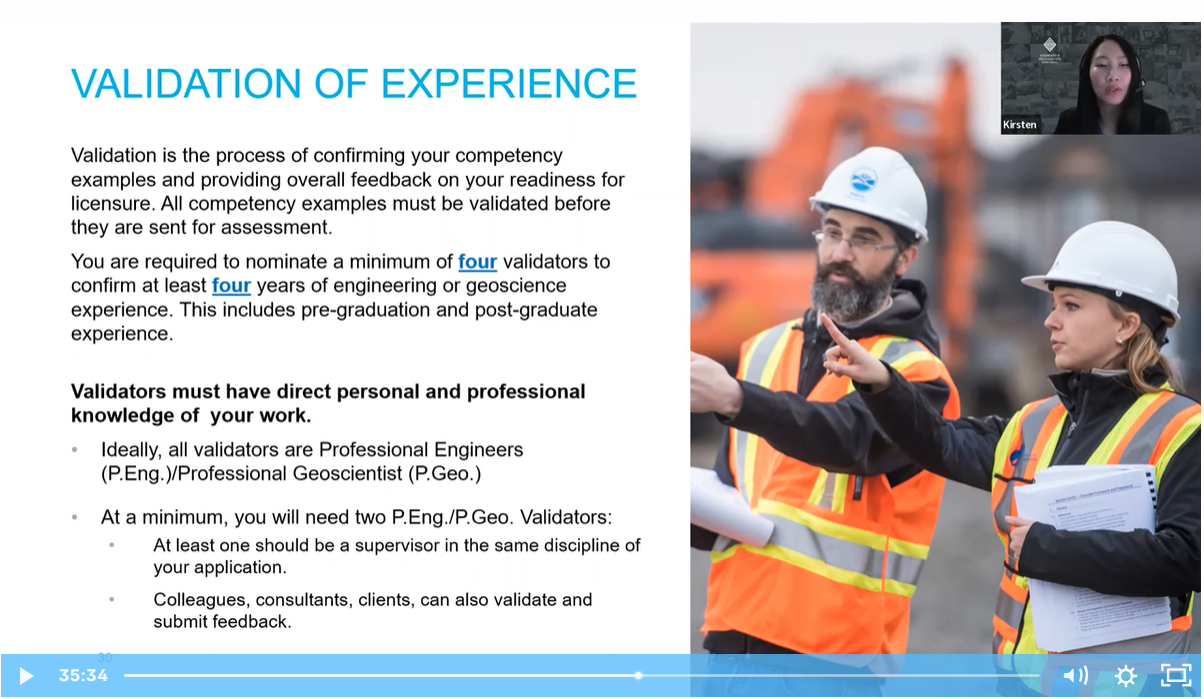In the Competency-Based Assessment (CBA) process for Professional Engineers (PEng), validators play a critical role in verifying applicants’ qualifications and readiness for licensure. Validators for Competency-Based Assessment provide an essential perspective by confirming that applicants demonstrate the competencies required to practice engineering safely and responsibly in Ontario. With validators’ input, your Engineering Association gains valuable insights into each applicant’s abilities from experienced professionals familiar with their work.
Choosing the right validators and collaborating effectively with them can make a significant difference in an applicant’s CBA submission. This post will guide you through the selection process, eligibility requirements, and best practices for working with validators, helping you strengthen your CBA application and move confidently toward licensure.
Who Are Validators for Competency-Based Assessment and Why Are They Important?
Validators for Competency-Based Assessment are experienced professionals who play a vital role in PEng licensure process by assessing the competencies of applicants. Validators serve as objective witnesses to an applicant’s abilities, confirming that the applicant has met specific competencies required to practice engineering in Ontario. Their evaluations provide an additional level of assurance to your Engineering Association, ensuring that applicants possess the necessary skills, knowledge, and ethical judgment to work safely and responsibly as licensed engineers.
Validators’ assessments are based on firsthand knowledge of the applicant’s work, whether through direct supervision, collaboration, or mentorship. By rating the applicant’s competencies, validators give the Engineering Association insight into the applicant’s professional performance, particularly in areas like technical competence, project management, and ethical responsibility. This validation is critical to the Competency-Based Assessment, as it adds an external, unbiased perspective that strengthens the overall integrity of the licensure process.
In short, validators help ensure that only qualified, competent engineers receive their license to practice in Ontario, supporting Engineering Association’s mission of protecting public safety and upholding the profession’s standards. Choosing appropriate validators and working with them effectively is essential for applicants who want to present a strong, reliable CBA submission.

Eligibility Criteria of Validators for Competency-Based Assessment
Selecting eligible validators for Competency-Based Assessment is essential to ensuring that the Engineering Association receives an accurate and reliable evaluation of an applicant’s qualifications. The Engineering Association has established specific eligibility requirements for validators, tailored to account for both Canadian and international work experiences. By meeting these criteria, validators provide credible and informed assessments that support the integrity of the CBA process. During the PEO Webinar on November 05, 2024, the following scenarios were discussed:
- Canadian Experience:
For work experience gained in Canada, validators for Competency-Based Assessment must be licensed Professional Engineers (P.Eng.) in Canada. This requirement ensures that validators are familiar with Canadian engineering standards, codes, and practices, which are critical for assessing competencies in alignment with the Engineering Association’s guidelines. A validator’s status as a licensed engineer in Canada confirms their understanding of the local engineering landscape and regulatory expectations. - International Experience:
For applicants with international work experience, the Engineering Association allows more flexibility. Validators for international experience are not required to hold a Canadian P.Eng. license, but ideally, they should be licensed in their jurisdiction or be recognized as senior practitioners. If they are not licensed, validators for Competency-Based Assessment should at least hold a senior or supervisory position in the field, with direct knowledge of the applicant’s work. This ensures that international validators are credible witnesses to the applicant’s competencies, even when Canadian licensing is not applicable. - Direct Knowledge of Applicant’s Work:
Regardless of location, all validators must have direct knowledge of the applicant’s work to provide a meaningful and accurate assessment. Validators are typically direct supervisors, senior colleagues, or experienced mentors who have observed the applicant’s engineering abilities and contributions firsthand. This firsthand knowledge allows validators to provide a detailed evaluation of the applicant’s skills, judgment, and readiness for professional practice.
By selecting validators who meet these eligibility criteria, applicants strengthen the credibility of their CBA submission and ensure that the Engineering Association receives a well-rounded perspective on their qualifications. Ensuring validator eligibility is crucial to the application process, as it demonstrates the applicant’s commitment to transparency and professionalism.

Tips for Choosing Effective Validators for Competency-Based Assessment
Selecting the right validators for Competency-Based Assessment is crucial to creating a strong and well-supported application. Choosing validators who are knowledgeable, responsive, and familiar with your work will enhance the credibility of your submission and streamline the assessment process. Here are some key tips to help you select the most effective validators:
- Select Validators Familiar with Your Work:
The best validators for Competency-Based Assessment are those who have closely observed your engineering work, such as direct supervisors, project leads, or senior colleagues. These individuals can provide informed evaluations of your contributions and competencies because they have firsthand experience with your technical skills, problem-solving abilities, and professional conduct. A validator with detailed knowledge of your work can offer more accurate and meaningful feedback. - Consider a Variety of Validators if Needed:
If your experience covers multiple roles or diverse areas of engineering practice, it may be beneficial to select a range of validators who can address different competencies. For example, one validator might be best suited to evaluate your technical skills, while another could validate your project management or teamwork abilities. By choosing validators who specialize in different aspects of your experience, you ensure that each competency is assessed by the most qualified person. - Check Their Availability and Willingness:
Before finalizing your validators, confirm their willingness and availability to participate in the CBA process. Validators must dedicate time to review your work examples, provide ratings, and complete the necessary forms. Make sure each validator understands the commitment involved and is prepared to respond promptly to the Engineering Association’s requests. - Use Validators with Relevant Credentials:
For Canadian experience, select validators who are licensed Professional Engineers (P.Eng.) in Canada, as required by the Engineering Association. For international experience, look for validators who are licensed in their jurisdiction or recognized as senior practitioners. Ensuring that your validators for Competency-Based Assessment hold appropriate credentials strengthens the credibility of their assessments and demonstrates your commitment to meeting professional standards. - Discuss Expectations and Process:
Provide each validator with an overview of the CBA process, including the competencies they’ll be assessing and any specific guidelines from the Engineering Association. Sharing relevant sections of the applicant and validator guides can help them understand what is required. This initial discussion ensures that validators know the expectations, reducing the likelihood of misunderstandings or delays.
Choosing effective validators for Competency-Based Assessment can greatly enhance the strength of your CBA submission by providing the Engineering Association with comprehensive, credible assessments of your competencies. By following these tips, you ensure that your validators are well-prepared to support your application and contribute to a smoother, more efficient assessment process.
Responsibilities of Validators for Competency-Based Assessment
Validators for Competency-Based Assessment hold significant responsibilities in the CBA process. They provide an objective assessment of an applicant’s competencies, offering the Engineering Association a reliable measure of the applicant’s skills, judgment, and readiness for professional practice. To support applicants effectively, validators need a clear understanding of their duties, which include reviewing work examples, providing ratings, and offering insights based on their firsthand knowledge.
- Reviewing the Applicant’s Work Examples:
validators for Competency-Based Assessment begin by reviewing the specific work examples submitted by the applicant for each competency. This includes examining the context of the project or task, the actions taken by the applicant, and the outcomes achieved. Validators must focus on the applicant’s direct contributions, as their role is to verify that the applicant possesses the required skills and knowledge. - Providing Competency Ratings:
Validators are required to rate each competency based on a scale defined by the Engineering Association, assessing how well the applicant has demonstrated proficiency in each area. Ratings reflect the complexity of tasks the applicant performed, the level of supervision required, and the applicant’s overall impact on the project. This rating process provides the Association with an additional, credible perspective on the applicant’s abilities. - Offering Constructive Feedback:
In addition to providing ratings, validators may be asked to offer comments or additional context where needed. This feedback helps the Engineering Association’s assessors understand the applicant’s competencies in detail, especially in areas where the validator’s expertise or familiarity with the applicant’s work provides valuable insights. - Ensuring Timely Submission:
Validators play an important role in keeping the application process on schedule. By responding promptly to the Engineering Association’s requests and submitting their assessments within the required timeframe, validators help applicants avoid unnecessary delays. It’s essential for validators to communicate any scheduling conflicts in advance to allow applicants time to make adjustments if necessary. - Following Guidelines in the Validator Guide:
The Engineering Association provides a validator guide that outlines each step of the CBA validation process, including the expectations for each competency rating and the specifics of the rating scale. Validators for Competency-Based Assessment should review this guide carefully to ensure they understand how to evaluate competencies consistently and fairly. This resource helps validators fulfill their responsibilities accurately and align their assessments with the Association’s standards.
By fulfilling these responsibilities, validators contribute significantly to the credibility and thoroughness of the applicant’s CBA submission. Their objective evaluations play a vital role in helping the Engineering Association determine whether applicants are prepared for licensure, ensuring only qualified engineers receive the privilege of professional practice.
Common Challenges and How to Address Them
While working with validators for Competency-Based Assessment is an essential part of the CBA process, certain challenges may arise. Being prepared to address these common issues can help ensure a smoother experience for both applicants and validators, making the CBA submission as effective as possible.
- Unavailable or Unresponsive Validators:
One of the most common issues is encountering validators for Competency-Based Assessment who become unavailable or unresponsive, which can delay the application process. To prevent this, reach out to potential validators early in the application process to confirm their availability and willingness. If a validator becomes unresponsive, try following up with a gentle reminder. In cases where they are no longer able to participate, consider selecting a backup validator who meets the eligibility criteria and can provide timely feedback. - Privacy and Confidentiality Concerns:
Many applicants worry about sharing sensitive project details, especially when dealing with proprietary information. To address this, focus on describing the skills and methods used rather than specific confidential data. If necessary, use placeholders (e.g., “the client” or “the project”) rather than exact names. By keeping the focus on competencies rather than proprietary details, applicants can maintain confidentiality while still effectively demonstrating their skills. - Differing Opinions on Competency Ratings:
Sometimes, an applicant’s self-assessment rating may differ from the validator’s rating. To address this, open a dialogue with your validator before they submit their ratings, discussing the level of experience and the complexity of tasks you’ve performed. This can help align expectations and provide clarity on competencies. However, it’s natural for ratings to vary, and the Engineering Association will consider both perspectives during their assessment. - Multiple Validators for Different Competencies:
If your experience covers a wide range of competencies, it may require multiple validators for Competency-Based Assessment to address each competency area. In this case, be sure to communicate clearly with each validator about their specific responsibilities. Provide them with a clear list of competencies they’ll be assessing, along with any relevant context, to avoid confusion and ensure all areas are covered. - Navigating the Validator Guide and Requirements:
Validators for Competency-Based Assessment who are unfamiliar with the Engineering Association’s guidelines may need additional support. Share key sections of the validator guide with them, emphasizing the rating scale and any specific requirements. You might also consider offering a brief overview or discussion to ensure they’re comfortable with the process. Validators who understand the guidelines are more likely to provide accurate, consistent assessments.
By addressing these common challenges proactively, applicants can foster effective, collaborative relationships with their validators. Taking these steps will help ensure the validation process is efficient, thorough, and supportive of a strong CBA submission.
Conclusion
Selecting and collaborating with effective validators for Competency-Based Assessment is a crucial step in the licensing journey. Validators provide an invaluable, objective view of an applicant’s qualifications, helping the Engineering Association assess competencies accurately and uphold the standards of professional engineering practice. By choosing validators who are knowledgeable, available, and familiar with the applicant’s work, applicants can build a well-supported submission that enhances their CBA application.
Clear communication and proactive planning can help overcome common challenges, such as managing confidentiality or aligning on competency ratings. Remember, validators are key partners in this process, contributing significantly to the strength and credibility of your application.
If you’re preparing for the CBA or need guidance, explore resources like the validator guide or consider using tools like CBA Pro to streamline your application and manage validator communications effectively. With the right support and preparation, you’ll be well on your way to meeting the requirements for licensure and advancing confidently toward your professional engineering goals.
Resources
What is Competency-Based Assessment? | Key Takeaways from PEO’s Webinar Nov 5, 2024 (Click Here)
Tips On Improving Your Professional Engineer Application – EGBC (Click Here)
Working in Canada: Key Competencies for Engineers and Geoscientists – EGBC (Click Here)
Professional Engineers Ontario (PEO) Validator Guide (Click Here)
Path to Professional Licensure – EGBC (Click Here)

